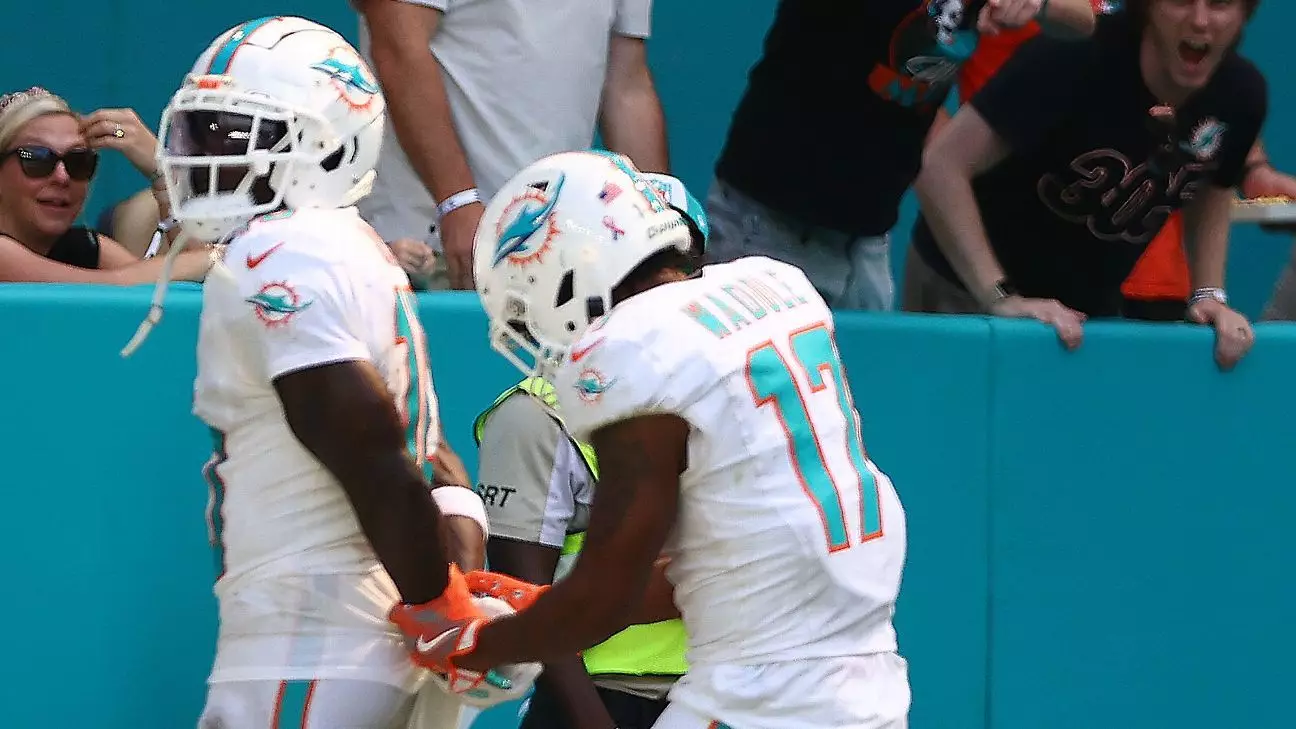In a shocking turn of events before a high-stakes matchup in Miami Gardens, Florida, multiple Miami Dolphins players found themselves entangled in a confrontation with the Miami-Dade Police Department. The incident centered around the All-Pro wide receiver Tyreek Hill, who was reportedly detained shortly before the game against the Jacksonville Jaguars. According to sources, Hill, who was driving to Hard Rock Stadium in a hurry, was stopped for alleged speeding. However, what began as a routine traffic stop escalated rapidly when a “verbal altercation” ensued, leading to Hill being placed in handcuffs.
The confrontation was not just a private affair; it was witnessed by fans who subsequently captured and shared footage on social media platforms, causing the situation to spiral into a viral moment. This incident raises critical questions about authority, treatment of high-profile athletes, and broader social implications.
Tyreek Hill expressed confusion over the escalation of the situation, revealing his attempts to remain calm and composed during the encounter. “Right now, I’m still trying to put it all together … I still don’t know what happened,” he stated after the game. This bafflement underscores a sentiment shared by many athletes—even those as accomplished as Hill—who often find themselves at the intersection of fame and public scrutiny.
The phrase “What if I wasn’t Tyreek Hill?” reveals deeper anxieties regarding race and how individuals are treated differently based on their identity and public persona. By highlighting the disparities in treatment faced by individuals who do not share his fame, Hill offers a poignant observation about systemic issues within law enforcement.
After the ordeal, Hill performed remarkably on the field, racking up 130 receiving yards, including an impressive 80-yard touchdown. This achievement underscored his resilience, but it was the support from his teammates that stood out as the most significant aspect of the day. Dolphins offensive lineman Terron Armstead noted that while Hill was understandably upset, he remained focused on playing.
Teammates Calais Campbell and Jonnu Smith became actively involved in the situation, attempting to defuse the tension after witnessing Hill’s detainment. Campbell himself was subsequently detained by police for allegedly disobeying an officer’s orders, which raises concerning questions about the police’s handling of the situation. “He told me I wasn’t being arrested but he cited me for being detained,” Campbell recounted. This multi-layered conflict reveals how quickly the dynamics can shift in tense situations involving authority.
In the aftermath of the incident, Miami-Dade PD’s Director Stephanie V. Daniels announced an administrative review of the officers involved. This response indicates an acknowledgment of potential wrongdoing and an understanding of the need for accountability within law enforcement. As the investigation unfolds, it remains vital for the police department to mitigate future incidents by addressing systemic biases and improving community relations.
The conversation surrounding race, authority, and public perception continues to echo in sports dialogues today. Hill’s conclusions about the events he experienced reveal a broader narrative that reflects the zeitgeist in America, where racial tensions often intersect with professional sports. This incident not only highlights the complexities athletes can face but also urges further discourse on how society responds to such encounters.
The support players demonstrated for Hill during this tumultuous event showcases the camaraderie and solidarity often found among teammates. Dolphins head coach Mike McDaniel recognized the emotional toll the situation had on players, emphasizing the importance of preparedness in the face of uncertainty. “You try to prepare a team to handle the unknown,” he noted.
While the Dolphins ultimately triumphed over the Jaguars with a score of 20-17, the underlying struggle presented by the initial encounter cannot be overlooked. It serves as a reminder that even amidst victory, there are important lessons to learn from adversity. The collective experience of players like Hill, Campbell, and Smith provides insight into how an insulated sporting environment must also contend with the realities of social challenges.
The incident involving Tyreek Hill not only invites scrutiny about law enforcement conduct and racial dynamics but also reinforces the critical nature of team unity in overcoming adversity. As the Dolphins continue to navigate their season, they are propelled not only by their skills on the field but also by their shared experiences as a community bound together through challenges.


Leave a Reply